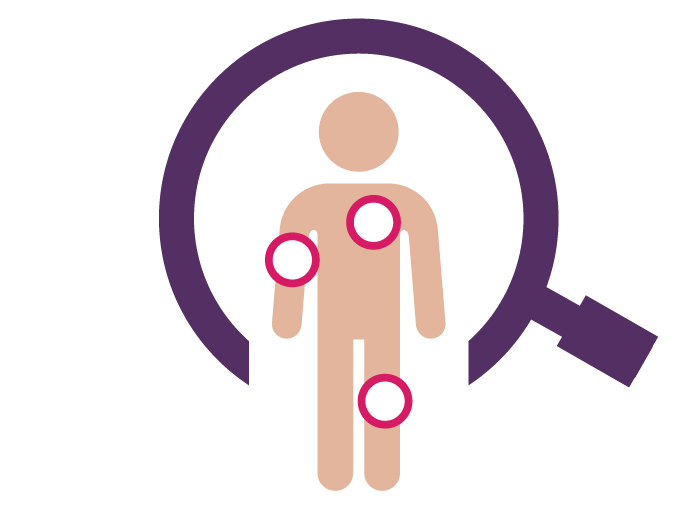For adults with active non-radiographic axial spondyloarthritis

NON-RADIOGRAPHIC AXIAL SPONDYLOARTHRITIS FACTS AND SYMPTOMS
What is non-radiographic axial spondyloarthritis (nr-axSpA)?
Nr-axSpA is a type of inflammatory arthritis of the spine that is undetectable on an X-ray. It is part of a family of diseases called axial spondyloarthritis (axSpA). AxSpA includes 2 underdiagnosed conditions: nr-axSpA and ankylosing spondylitis (AS). In both conditions, inflammation in the spinal joints can cause chronic back pain, stiffness, fatigue, and reduced mobility. If left untreated, this inflammation can cause irreversible damage.
What are the symptoms of nr-axSpA?
Nr-axSpA leads to symptoms like pain and stiffness in the lower back and spine, as well as possible pain in the neck, hips, and buttocks. Other symptoms include pain at night, stiffness upon waking, fatigue, and loss of mobility.

How is nr-axSpA diagnosed?
Nr-axSpA is difficult to diagnose because the damage to the spine cannot be seen on an X-ray. Many people live with it for years before it gets diagnosed. Nr-axSpA is only diagnosed by a doctor, like a rheumatologist. A rheumatologist will typically look at how inflammation is affecting your entire body, assess your history, and then run a variety of tests, including physical exams, imaging, and lab tests.
Why choose a rheumatologist? Rheumatologists are doctors that treat many diseases that are difficult to diagnose, like diseases of the spine and autoimmune diseases. A rheumatologist could help you understand more about your back pain, and if you may be suffering from mechanical back pain or inflammatory back pain.
What is the difference between non-radiographic axial spondyloarthritis and ankylosing spondylitis?
The main difference between non-radiographic axial spondyloarthritis (nr-axSpA) and ankylosing spondylitis (AS) is that nr-axSpA may not show visible spinal damage on an X-ray, while AS damage may be visible. Scroll down to learn more about the other differences between these 2 conditions.
nr-axSpA
AS
Can nr-axSpA develop into AS?
Up to 50% of nr-axSpA cases are at risk of progressing to AS, which may cause irreversible spinal fusion. Learn more about the symptoms of ankylosing spondylitis.
